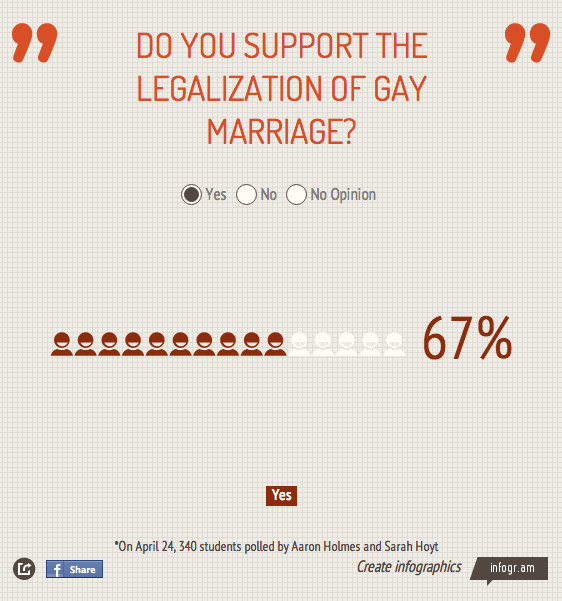
By HANNAH ROLLINS – Viewpoints Writer
The majority of students at Clarke Central believe in Gay Marriage, and those that do not have a harder time expressing their views without fear.
Gay Marriage is a divisive issue. Historically, marriage has been defined as between one man and one woman.
Recently, however, there have been increasing efforts to redefine marriage to include the right of same sex couples to marry. Some citizens have tried to defeat these efforts by supporting legislation to limit marriage to a relationship between one man and one woman. In a surprising decision this summer, section three of the Defense of Marriage Act (DOMA), which states that homosexual couples should not receive the same benefits as heterosexual ones, was held to be unconstitutional by the United States Supreme Court.
Despite the Supreme Court’s opinion, most of the states, a substantial percentage of the United States and prominent religions such as Christianity and its many divisions still do not recognize gay marriage.
Equality of marriage doesn’t end with gay marriage, rather it sparks new challenges to the traditional concept of marriage. If Gay Marriage were to be permissible, then there are many other groups that could plead those same benefits, such as polygamy, when a man has multiple wives, and incest, which is when someone has a romantic relationship with someone in their family. This proposition stretches the bounds of marriage, but people who are concerned about these connotations are too afraid to express their opinion, for fear of being reprimanded for speaking out.
Last year 67 percent of the students at Clarke Central High School were more likely to vote on the side of Gay Marriage rather than against it. That makes it harder for people who don’t necessarily agree with it to voice their opinion and reasoning.
“In a formal setting, where a teacher asks the class what you think about gay marriage, I have never raised my hand and answered that question,” junior Jyrekis Collins said, “I am not so much afraid but I don’t want to deal with the controversy of me being a person of hate.”
People tend to associate ‘bullying’ with opposition, but rather it’s a simple disparity.
“On the topic of homosexuals, I don’t support what they believe in, but I would never make fun or bully them even though I don’t support gay marriage,” senior Mykayla Stapleton said, “I have a right to my point of views, but I know that my views typically don’t get respected.”
It’s not only difficult for students to express their views in school, but teachers can be intimidated by students who believe in Gay Marriage, which can cause outbursts among them and unnecessary complaints.
“I think people do avoid the topic in general because it makes people uncomfortable, and especially if they do have an opposing viewpoint like I do, in believing in traditional marriage,” English Department teacher Amy Stapleton said.
People have different views, different opinions, different ideals. Yet many don’t recognize the differences, too caught up in their own views, their own opinions and ideals; and the people that have those different views are hindered by those that don’t.
“People who didn’t believe in gay marriage should have stood up for themselves,” Collins said, “(They should) not be quiet because this is something that we do not believe in.”
Never be afraid to speak out.
More from Hannah Rollins
